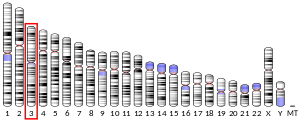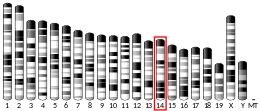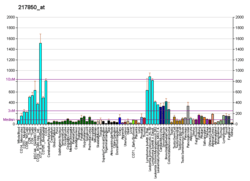GNL3
Guanine nucleotide-binding protein-like 3, also known as nucleostemin, is a protein that in humans is encoded by the GNL3 gene.[5][6][7] It is found within the nucleolus that binds p53.[8] Nucleostemin regulates the cell cycle and affects cell differentiation, decreasing in amount as this differentiation progresses.[8] It is a marker for many stem cells and cancer cells.[9]
Interactions
GNL3 has been shown to interact with Mdm2[10] and P53.[6]
gollark: I mean, the policies relating to COVID-19 are controlled by governments, which presumably should have *some* plan.
gollark: I propose that we all push in the opposite direction to tectonic plate motion.
gollark: Apparently. Or at least home breadmaking, because she did it first and is now... finding it harder to get ingredients.
gollark: Firing your pandemic response team a while before a pandemic is at least not as stupid as doing it during one.
gollark: I blame some sort of weird interaction between insurance companies, regulation/the government, consumers of healthcare services, and the companies involved in healthcare.
References
- GRCh38: Ensembl release 89: ENSG00000163938 - Ensembl, May 2017
- GRCm38: Ensembl release 89: ENSMUSG00000042354 - Ensembl, May 2017
- "Human PubMed Reference:". National Center for Biotechnology Information, U.S. National Library of Medicine.
- "Mouse PubMed Reference:". National Center for Biotechnology Information, U.S. National Library of Medicine.
- Charpentier AH, Bednarek AK, Daniel RL, Hawkins KA, Laflin KJ, Gaddis S, MacLeod MC, Aldaz CM (Nov 2000). "Effects of estrogen on global gene expression: identification of novel targets of estrogen action". Cancer Res. 60 (21): 5977–5983. PMID 11085516.
- Tsai RY, McKay RD (Dec 2002). "A nucleolar mechanism controlling cell proliferation in stem cells and cancer cells". Genes Dev. 16 (23): 2991–3003. doi:10.1101/gad.55671. PMC 187487. PMID 12464630.
- "Entrez Gene: GNL3 guanine nucleotide binding protein-like 3 (nucleolar)".
- Ross, Michael H.; Pawlina, Wojciech. (2011). Histology : a text and atlas : with correlated cell and molecular biolog. Philadelphia: Wolters Kluwer/Lippincott Williams Wilkins Health. p. 79. ISBN 978-0-7817-7200-6.
- Niall M. Adams (29 November 2010). Advances in Nuclear Architecture. Springer. p. 31. ISBN 978-90-481-9898-6. Retrieved 27 September 2011.
- Dai MS, Sun XX, Lu H (Jul 2008). "Aberrant expression of nucleostemin activates p53 and induces cell cycle arrest via inhibition of MDM2". Mol. Cell. Biol. 28 (13): 4365–4376. doi:10.1128/MCB.01662-07. PMC 2447154. PMID 18426907.
Further reading
- Andersen JS, Lyon CE, Fox AH, Leung AK, Lam YW, Steen H, Mann M, Lamond AI (2002). "Directed proteomic analysis of the human nucleolus". Curr. Biol. 12 (1): 1–11. doi:10.1016/S0960-9822(01)00650-9. PMID 11790298.
- Scherl A, Couté Y, Déon C, Callé A, Kindbeiter K, Sanchez JC, Greco A, Hochstrasser D, Diaz JJ (2002). "Functional proteomic analysis of human nucleolus". Mol. Biol. Cell. 13 (11): 4100–4109. doi:10.1091/mbc.E02-05-0271. PMC 133617. PMID 12429849.
- Schwartz PH, Bryant PJ, Fuja TJ, Su H, O'Dowd DK, Klassen H (2003). "Isolation and characterization of neural progenitor cells from post-mortem human cortex". J. Neurosci. Res. 74 (6): 838–851. doi:10.1002/jnr.10854. PMID 14648588.
- Liu SJ, Cai ZW, Liu YJ, Dong MY, Sun LQ, Hu GF, Wei YY, Lao WD (2004). "Role of nucleostemin in growth regulation of gastric cancer, liver cancer and other malignancies". World J. Gastroenterol. 10 (9): 1246–1249. doi:10.3748/wjg.v10.i9.1246. PMC 4622760. PMID 15112336.
- Sijin L, Ziwei C, Yajun L, Meiyu D, Hongwei Z, Guofa H, Siguo L, Hong G, Zhihong Z, Xiaolei L, Yingyun W, Yan X, Weide L (2004). "The effect of knocking-down nucleostemin gene expression on the in vitro proliferation and in vivo tumorigenesis of HeLa cells". J. Exp. Clin. Cancer Res. 23 (3): 529–538. PMID 15595646.
- Tsai RY, McKay RD (2005). "A multistep, GTP-driven mechanism controlling the dynamic cycling of nucleostemin". J. Cell Biol. 168 (2): 179–184. doi:10.1083/jcb.200409053. PMC 2171593. PMID 15657390.
- Politz JC, Polena I, Trask I, Bazett-Jones DP, Pederson T (2005). "A nonribosomal landscape in the nucleolus revealed by the stem cell protein nucleostemin". Mol. Biol. Cell. 16 (7): 3401–3410. doi:10.1091/mbc.E05-02-0106. PMC 1165421. PMID 15857956.
- Han C, Zhang X, Xu W, Wang W, Qian H, Chen Y (2005). "Cloning of the nucleostemin gene and its function in transforming human embryonic bone marrow mesenchymal stem cells into F6 tumor cells". Int. J. Mol. Med. 16 (2): 205–213. doi:10.3892/ijmm.16.2.205. PMID 16012751.
- Yang HX, Jin GL, Meng L, Zhang JZ, Liu WB, Shou CC (2005). "Screening and identification of proteins interacting with nucleostemin". World J. Gastroenterol. 11 (31): 4812–4814. doi:10.3748/wjg.v11.i31.4812. PMC 4398727. PMID 16097049.
- Rual JF, Venkatesan K, Hao T, Hirozane-Kishikawa T, Dricot A, Li N, Berriz GF, Gibbons FD, Dreze M, Ayivi-Guedehoussou N, Klitgord N, Simon C, Boxem M, Milstein S, Rosenberg J, Goldberg DS, Zhang LV, Wong SL, Franklin G, Li S, Albala JS, Lim J, Fraughton C, Llamosas E, Cevik S, Bex C, Lamesch P, Sikorski RS, Vandenhaute J, Zoghbi HY, Smolyar A, Bosak S, Sequerra R, Doucette-Stamm L, Cusick ME, Hill DE, Roth FP, Vidal M (2005). "Towards a proteome-scale map of the human protein-protein interaction network". Nature. 437 (7062): 1173–1178. doi:10.1038/nature04209. PMID 16189514.
- Kafienah W, Mistry S, Williams C, Hollander AP (2006). "Nucleostemin is a marker of proliferating stromal stem cells in adult human bone marrow". Stem Cells. 24 (4): 1113–1120. doi:10.1634/stemcells.2005-0416. PMID 16282439.
- Fan Y, Liu Z, Zhao S, Lou F, Nilsson S, Ekman P, Xu D, Fang X (2006). "Nucleostemin mRNA is expressed in both normal and malignant renal tissues". Br. J. Cancer. 94 (11): 1658–1662. doi:10.1038/sj.bjc.6603145. PMC 2361296. PMID 16670719.
- Lacina L, Smetana K, Dvoránková B, Stork J, Plzáková Z, Gabius HJ (2006). "Immunocyto- and histochemical profiling of nucleostemin expression: marker of epidermal stem cells?". J. Dermatol. Sci. 44 (2): 73–80. doi:10.1016/j.jdermsci.2006.08.008. PMID 17000083.
- Zhu Q, Yasumoto H, Tsai RY (2006). "Nucleostemin delays cellular senescence and negatively regulates TRF1 protein stability". Mol. Cell. Biol. 26 (24): 9279–9290. doi:10.1128/MCB.00724-06. PMC 1698521. PMID 17000763.
- Liu SJ, Zhang ZH, Zhang DQ, Sui XM, Liu YJ, Cai ZW, Yuan XY, Sun LQ, Hu GF, Liu RL (2006). "Gene profiling after knocking-down expression of nucleostemin in Hela cells using oligonucleotide DNA microarray". J. Exp. Clin. Cancer Res. 25 (4): 575–583. PMID 17310849.
This article is issued from Wikipedia. The text is licensed under Creative Commons - Attribution - Sharealike. Additional terms may apply for the media files.




